- Jul 10, 2003
- 29,206
Thanks for that [MENTION=6886]Bozza[/MENTION].
strange that the BBC decided to muffle the sound of and commentate over the bugle playing the last post before the Silence at 11:00. The news reader felt it necessary to talk over it, saying how the BBC would be falling silent at 11., and welcome viewers from BBC 1
A lack of respect
View attachment 142063
Private DAWSON, FRED
Service Number 82431
Died 10/11/1918 in France
Aged 18 years 5 months
"D" Coy. 11th Bn.
Royal Fusiliers
Son of Joseph and Ann Dawson,
Buried TERLINCTHUN BRITISH CEMETERY, WIMILLE
My Great Uncle Fred. Died on the day before the Great War ended, 103 years ago yesterday, aged 18
strange that the BBC decided to muffle the sound of and commentate over the bugle playing the last post before the Silence at 11:00. The news reader felt it necessary to talk over it, saying how the BBC would be falling silent at 11., and welcome viewers from BBC 1
A lack of respect
We were following online and ready to stand for the 2 minutes at 11:59 CET. We had BBC on but they were still talking (Maybe online was delayed)
We swapped to Sky which showed several locations but there was no clear end to the 2 minutes as far as I saw.
Online is always a bit delayed, and you could hear on the tv the last post being sounded in the background after the silence started at one location all of which is fine. Its the act of remembrance, not that its all perfectly in sync that matters.
I always stop what im doing for the last post and the two mins, even if its not as close to the exact time as I would like,


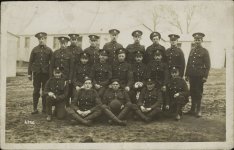
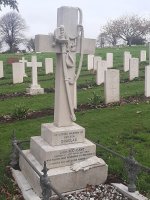
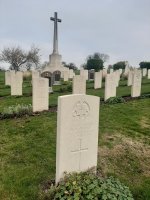
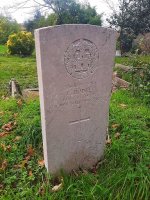
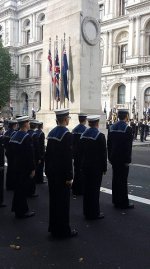
BBC4 broadcast some very powerful documentaries this week, focusing on the Somme (Tuesday evening) and Passchendaele (Wednesday evening), using a mixture of archive footage and the recollections of British soldiers and nurses serving at the front, plus those who were children at the time, with fathers fighting abroad.
The stilted footage and the vivid recollections of the former soldiers and nurses went some way to reflect the unmitigated and hellish horror of what happened in those godforsaken fields all those years ago, in so far as footage can, for those us fortunate enough to never have had to experience it first hand. However, for me some of the most poignant sections were the memories of those who were children during WWI, with fathers at the front.
One contributor was 9 when her father was killed in action and as her mother had to go out to work, she was left with the responsibility of effectively running the house and bringing up her younger siblings - whilst also trying to come to terms with never seeing her dad again. She recalled standing outside a toy shop one Christmas eve with her younger brothers and sisters, looking at the toys in the window. A woman (who obviously knew the family's circumstances), stopped and told them go inside the shop to look at the toys inside and get out of the rain. When they came to leave the shop a short while later, same the woman was there with two big bags - full of the toys they'd been looking at in the window display.
"Get yourselves straight home," she said to them, handing them the bags. "And tell your mother you've met Mrs Christmas."
Oddly, that story probably affected me more than any other - and brought home the huge sacrifice that those left behind endure too.
Anyway, apologies for the long post but if you have a chance, the BBC4 documentaries are truly humbling and well with catching up with.
Five years ago I wrote a piece about a soldier from Sussex for a thing about the Somme. Today seems like an appropriate time to get it out. I'm not sure how long it'll come out in here, apologies if it's too long:
View attachment 142065
I decided to write this a few weeks ago after hearing some students on a train debating whether we should still be commemorating the First World War when there are no survivors left.
On 1st July there will be events around the country recognising the hundredth anniversary of the first day of the Battle of the Somme. It’s a battle that risks being lost in numbers – the nearly 20,000 British men killed and the almost 40,000 more wounded, many in the first 60 minutes, the 1.5 million shells fired by the artillery ahead of the attack, supposedly to cut the 14 miles of German wire (which it failed to do), the 141 days the battle officially lasted for.
As always every number is a personal story. That chap in the photo is a story behind a number too, but more on that later.
30th June, the day before the Battle of the Somme began, became known as the Day Sussex Died – the Sussex Regiment (Southdown Battalions) being used for a diversionary attack which resulted in 365 men killed or missing for what is generally considered neglible impact, a catastrophically optimistic action that scarecly gets a mention anywhere and which saw men from all over Sussex among the dead.
The next day, that first day of the Somme, Sussex suffered again with many more killed. Others were wounded and would die over the coming weeks and months. George Fellows of Lewes left a wife and eight children when he succumbed to wounds at home on 13th July 1916 and is buried now in that town not far from Eastport Lane where he lived. On that same day, a few minutes walk up the hill also in Lewes the Pelling family lost their son Ernest, also to wounds from the Somme having returned home to Bull Lane. Death abroad. Death at home. The war was never some remote event.
The names and the unimaginable impact go on and on for every single one of those numbers we’ll hear spoken about in the coming weeks, they aren’t just numbers though, but people. Which brings me back to the man in the photo. This is one of those mostly anonymous photos you see for sale when family albums get split up, the photos piled in boxes and sold off cheap as curiosities. I picked this one up off eBay and would like to think I can return it to someone in his family, because this one is unusual in that it has a name on it – G. Morley.
His cap badge shows he was in the Sussex Regiment. I’ve looked into it and he’s almost certainly George Morley, a chimney sweep from Hastings, married to Sarah and with five children – in the 1911 census two of the children have his wife’s maiden name (or name from a first marriage) so he was perhaps a father and a step-father.
George was killed in action near the Somme, at Beaumont Hamel. Not as part of the main battle, but after the history books say it had finished, on 16th December 1916, aged 35. There was no major British action that day, and George was one of the hundreds killed every day in the war, in the endless grinding attrition of snipers and shells fired speculatively across no man’s land, a life of family, of potential and hope disposed of so casually and wastefully it’s impossible to comprehend.
The regimental diary in the week building up to 16th December is full of the names of places that resonate with anyone who has studied the history of the First World War: Mametz, High Wood and more – as George’s battalion moved through broken, damaged landscapes to the front line. Places fought over for much of the duration and still littered with explosives even today. High Wood had only been captured a few weeks before George’s death, after multiple failed, costly attacks, only being finally overrun when 3000lbs of explosives were tunneled underneath and detonated.
This is the landscape George went into, a ruined, desolate place, with no recognisable roads, ruined buildings, rats, shattered trees and and unburied bodies everywhere, and constant danger in a cold, wet winter.
He went into the front line on the 15th December, and on the 16th some men, including George, were sent out at night to dig supporting trenches in the chalky soil “80 to 130 yards” to the rear – an exposed, dangerous job hence being done in darkness, though of course after little or no sleep. Apparently the day had been “quiet except for occasional shelling” yet the digging group were hit that night, the deaths reported in the diary as “4 O.Rks [other ranks] killed, 3 wounded.”
Again no names, just numbers. Instant anonymity for those four men which somehow seems to suggest little value was placed on them. His wife and children would have heard via a standard emotionless telegram just before Christmas.
George has no known grave – he’s one of the 70,000+ on the Thiepval Memorial who don’t. Another number that’s so big it obscures the reality of the fact each is an individual man.
Looking at the register of names on the Thiepval Memorial, the page which has George Morley on has 31 other Morley’s from all over the country (there’ll be more on the preceding and following pages). There’s another George too, whose name is below his however it has been crossed out, presumably because at some point remains were found. There’s certainly an awful story there too.
In the photo George’s cap is battered, far more than the pristine, sharp lines you normally see in such photos, we don’t of course know why but there’ll be a reason, something it represents in his character. And his face is confident, his hands are relaxed have none of the awkwardness often seen. His posture – everything about him – is comfortable and certain. And above all he’s human.
When you hear people talk about the Somme, about the numbers, about names we no longer recognise, and the horrors we have no possibility of relating to, it can be hard to take it in. So think of those men of Sussex and their families and maybe map the geography of their lives in your mind. Most of their streets are unchanged. Many of their houses still stand.
Think of George with his cigarette and battered cap and wife and children and all those like him, because it isn’t a list of anonymous names, it’s people we’re remembering.
A couple of years ago someone got in touch with me having come across this - they were doing their family history and were descended from George. The photo is now with his family again, exactly where it should be.
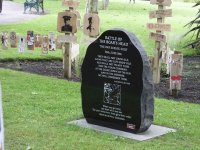
Lawrence Binyon.s poem "For the Fallen" includes
They shall grow not old
As we that are left grow old
Age shall not weary them
Nor the years condemn
At the going down of the sun
And in the morning
We will remember them
What is , unfortunately, not noticed by most is the order of words four and five in the first line. They are "GROW NOT" and not " not grow". Important that it is got right